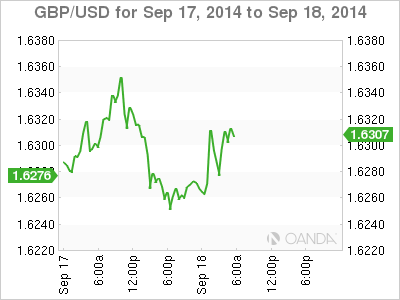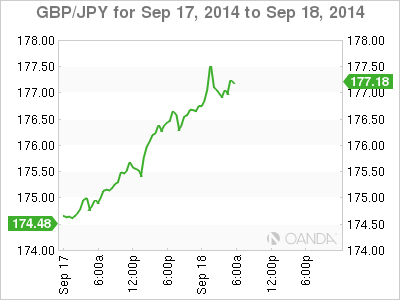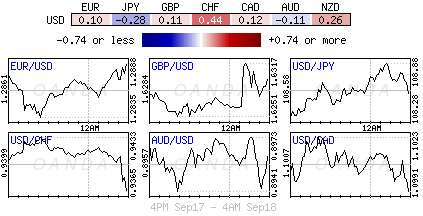It has been a long time coming, but Scottish nationalists finally get to vote for independent statehood today. A "Yes" or "No" win cannot be guaranteed, but rest assured, the market will need to brace itself for some sharp sterling swings no matter the outcome. Rumor, innuendo, and early exit polls will be keeping global capital markets jumping throughout the day. Depending on the percentage outcome (smart money has heavily backed a "No" vote), the current tension will either subside a tad, or find fresh legs similar to Canada's awfully close Quebec referendum in 1995 that saw the separatists narrowly defeated by a mere 50.58% of the popular vote.
A resurgent U.S. dollar, and fear of the unknown in the U.K., has produced significant market volume and volatility. On that note, the trading of the pound picked up considerably in the first half of September. Last week, GBP plummeted to a new 10-month low (£1.6035) after a sudden surge in support for Scottish independence. However, with the unionist "No" side gaining a narrow edge in the polls this week, it has supported sterling and squeezed some of the weaker GBP short positions before the polls opened earlier today.
Whiplash Trading Styles Abound
No matter what, there remains a distinct uneasiness in the market. Those opposing separation are quietly confident, but it’s the spread between the "Yes" and "No" vote that will drive future volatility. Of course, even a sovereignty win will cause havoc, politically, socially, and economically for a long time to come, and with that, anywhere from 4.5% to 8% pound depreciation is conceivable. In all likelihood, a "No" vote will cause sterling to bounce; how far will depend on the result spread. Current consensus estimates that the referendum has hurt the pound by about -2% outright, and in the very least, a "No" vote will unwind most of the damage done as GBP remains fundamentally a strong currency that has been unsettled by a nationalist situation.
There are many ifs, ands, and buts for a currency that may or may not be Scotland’s legal tender whatever the final outcome. For many, it has been an easy bet to sell the pound to wager on a sovereign outcome. Using the fixed-income or equity market to express similar thoughts has been inconclusive. Currently, U.K. interest rates are more beholden to the Federal Reserve's lower-for-longer pledge and the European Central Bank's whatever it takes analogy. Meanwhile, U.K stocks are focusing on financial equities that may or may not be based in Scotland in the foreseeable future. An inconclusive decision will only heighten future volatility. Investors require a resounding "No" vote to allow GBP to be fundamentally driven again, otherwise it's back to following the Quebec route: the issue gets to be repeated on every political agenda until it’s done to death.
A Braveheart Vote
Some Unionists fret many Scots will vote with their hearts and not their heads. Yet even the optimists believe that without a Scottish Central Bank or independent financial system which will take time to implement, owning sterling is a safer bet in the medium- to longer-term, as GBP will eventually be recycled throughout the U.K. economy. However, many will also be wary of a surprise outcome. The U.K. has one of the biggest current-account deficits in Europe and it certainly requires capital inflow. Any small surprises will push the pound quickly toward a £1.50 handle.
The techies have a slightly different take on the potential outcome. Since August 25 the maximum "No" vote suggested by opinion polls was 54%. They anticipate that the scope for the initial pound gains is roughly to £1.6645 (September 1 high) if the "No" vote is 55% or higher. An unexpected "Yes" will hit the pound hard and could easily depress cable to that psychological £1.50 range as highlighted above.
EU regulations supports U.K sales
A small distraction to today's sovereignty vote has been the release of the U.K's retail sales report this morning. The headline did manage to pick up last month (+0.4% vs. +0.0% m/m and +3.9% y/y), driven by strong household spending, which confirms the positive growth aspects for the economy in Q3. Electrical appliance stores were the main contributors to the increase in household goods sales. New energy saving regulations that became law at the end of last month encouraged shoppers to start "hoarding high-powered vacuum cleaners." Sterling reaction was relatively muted as the market again focuses on any Scottish referendum tidbits.
This article is for general information purposes only. It is not investment advice or a solution to buy or sell securities.
Opinions are the authors — not necessarily OANDA’s, its officers or directors. OANDA’s Terms of Use and Privacy Policy apply. Leveraged trading is high risk and not suitable for all. You could lose all of your deposited funds.
Recommended Content
Editors’ Picks
EUR/USD clings to gains above 1.0750 after US data

EUR/USD manages to hold in positive territory above 1.0750 despite retreating from the fresh multi-week high it set above 1.0800 earlier in the day. The US Dollar struggles to find demand following the weaker-than-expected NFP data.
GBP/USD declines below 1.2550 following NFP-inspired upsurge

GBP/USD struggles to preserve its bullish momentum and trades below 1.2550 in the American session. Earlier in the day, the disappointing April jobs report from the US triggered a USD selloff and allowed the pair to reach multi-week highs above 1.2600.
Gold struggles to hold above $2,300 despite falling US yields

Gold stays on the back foot below $2,300 in the American session on Friday. The benchmark 10-year US Treasury bond yield stays in negative territory below 4.6% after weak US data but the improving risk mood doesn't allow XAU/USD to gain traction.
Bitcoin Weekly Forecast: Should you buy BTC here? Premium

Bitcoin (BTC) price shows signs of a potential reversal but lacks confirmation, which has divided the investor community into two – those who are buying the dips and those who are expecting a further correction.
Week ahead – BoE and RBA decisions headline a calm week

Bank of England meets on Thursday, unlikely to signal rate cuts. Reserve Bank of Australia could maintain a higher-for-longer stance. Elsewhere, Bank of Japan releases summary of opinions.


